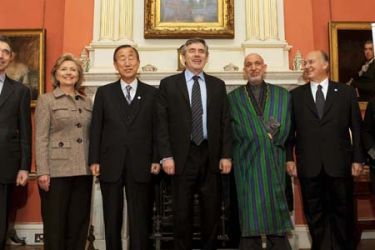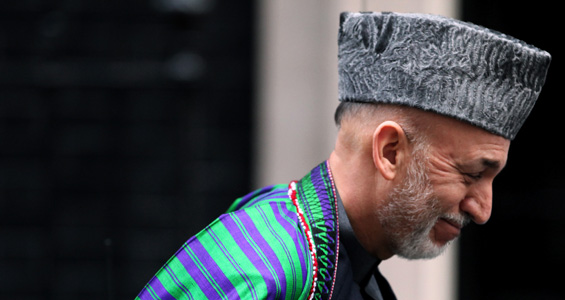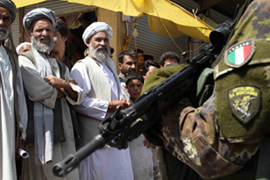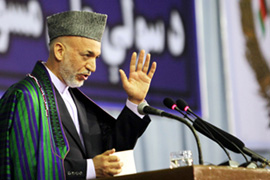Nine years, nine conferences
Donors reluctant to fund Afghan government because of corruption and weak ministries.

 |
| Deep mistrust still characterises the relationship between the Afghan government and its international donors [EPA] |
The Afghan government has a long list of demands for the international donors who will gather in Kabul on Tuesday for the ninth such conference since the start of the Afghanistan war in 2001.
Kabul will ask donors to focus 80 per cent of their aid budgets on a list of 23 “national priority programmes,” which will be introduced at the conference. Afghan officials will also push for a more transparent, organised aid process; donors often fail to report how they are spending money, leading to redundancies and inefficiencies.
“It’s not only about strengthening the legitimacy of the government,” said Omar Zahkilwal, the Afghan finance minister, at a press conference last week. “We believe this alignment with the government’s priorities, and therefore the people’s priorities, leads to sustainable development.”
Those goals, laudable as they may be, are hardly new. The London conference in 2006 produced a document – the Afghanistan Compact – which was to guide reconstruction efforts in Afghanistan. It declared that the Afghan government would take the lead on setting priorities, as defined in the Afghanistan National Development Strategy (ANDS), which was also approved at the conference.
A subsequent donors conference – in Paris, in 2008 – concluded with a communique which promised “increased, more predictable, transparent and accountable assistance”.
Little coordination
Yet those promises have gone mostly unmet. Seventy-seven per cent of the $29bn pledged by international donors has been spent without any input from the Afghan government, according to a review conducted last year by the finance ministry. That includes much of the money earmarked for the ANDS.
“The government has some valid points: Half of the money pledged for ANDS is out of line with priorities,” said Ashley Jackson, the head of Afghanistan policy at Oxfam, in an interview from Kabul. “There are no records of what the [provincial reconstruction teams] are doing … and many of the donors are bad at reporting, too.”
 The Afghan government says reconstruction teams often fail to report their work [EPA]
The Afghan government says reconstruction teams often fail to report their work [EPA]The Government Accountability Office, the investigative arm of the US congress, issued a report last week that found many Afghan development programmes do not have proper performance metrics. The US cannot track whether or not they are effective, in other words.
US and Nato officials have also encouraged Kabul to allow local governments more control over aid spending. The first “district community council” was stood up in Logar province earlier this year. The councils are supposed to better link aid distribution with the needs of the people, but their efforts are sometimes marred by corruption and nepotism.
“They’ve been aggressive in strengthening local governance,” said Caroline Wadhams, a South Asia analyst at the US-based Center for American Progress. “But it’s not a transparent process. People are being appointed by powerful politicians in Kabul. It’s not representative.”
Weak institutions
Nine years after the war began, a deep mistrust still characterises the relationship between the Afghan government and its international donors. The latter are often reluctant to funnel aid through the government in Kabul, fearing corruption or mismanagement.
“US agencies are making decisions about how these resources are to be used, and they’re trying to go around the government,” said John Brummet, the assistant inspector general for audits at the office of the US special inspector general for Afghanistan reconstruction. “That’s largely to avoid corruption … but also because of the weakness [of state institutions].”
 Karzai has taken small steps to end corruption, like creating an office of oversight [AFP]
Karzai has taken small steps to end corruption, like creating an office of oversight [AFP]Corruption is undeniable: Hundreds of millions (if not billions) of dollars have been stolen by government officials, and a recent report by Integrity Watch Afghanistan found that Afghans paid twice as much in bribes in 2009 as they did in 2006.
But a more fundamental problem is the persistent weakness of many ministries in Afghanistan. The Brookings Institution released a report in 2008, the Index of State Weakness, that ranked Afghanistan as having the second-weakest institutions in the world – behind only Somalia.
Little has changed since then. A US defence department report released in April found that the Afghan government has only a minimal presence in many areas of the country.
This creates what several people interviewed for this article called a “chicken and egg” problem. International donors are reluctant to rely on the Afghan government because it is so weak; but Afghan officials complain that efforts to circumvent their ministries further weaken the state.
“It’s clear that you undermine the credibility of the institutions by bypassing them,” said Martine van Bijlert, a co-director of the Afghanistan Analysts Network in Kabul. “But I’m not sure that the way to strengthen institutions is by spending more money through them.”
Intermediate steps
Weak Afghan ministries are routinely unable to meet their development goals. The Afghanistan Compact, for example, called for 65 per cent of Afghanistan’s urban households, and 25 per cent of rural households, to have electricity by the end of 2010.
Today, though, just 15 per cent of urban households, and only 6 per cent of rural families, have access to electricity, according to the Afghan Energy Information Center.
The compact also promised that 90 per cent of Afghan villages would have safe drinking water by the end of 2010 – but only 27 per cent do today, according to Oxfam.
“Often, in the provinces, the ministries only have a budget that covers salaries,” Jackson said. “People have nothing to do.”
Aid groups and analysts have proposed a number of short-term steps that the Afghan government can take to improve accountability.
Jackson said the government should approve a freedom of information law and strike down a constitutional provision that makes it almost impossible to prosecute cabinet ministers. Van Bijlert said Karzai should set up an evaluation system that removes ineffective ministers and provincial officials.
And Wadhams, in a new paper released last week, proposed changes to make the government more representative.
Karzai has made little progress towards implementing those reforms, though, and many analysts say that the government’s modest reforms to date will do little to resolve the tension with international donors.
“These conferences are not really changing anything,” Wadhams said.
“They create the illusion of momentum, but nothing is really changing.”